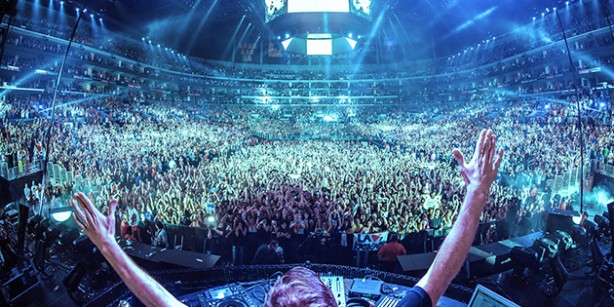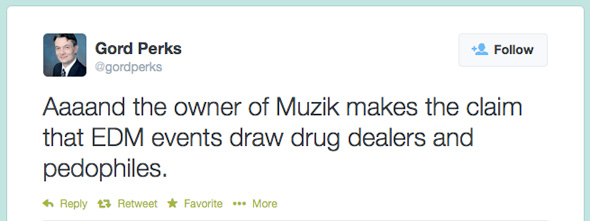 Music
Music
Toronto's EDM ban was absolutely ridiculous
by Mark Teo
May 8, 2014
Photo: Via Wikipedia.com
Toronto has a long and contentious relationship with dance music: Back in the late ’90s, the city waged war on its then-burgeoning rave scene. And in April, the city—led by right-wing tough-guy councillor Giorgio Mammoliti—introduced a motion to ban EDM events at the city-owned CNE grounds. The Exhibition Place board voted 4-3 to ban these events, at the urging of waterfront haunt Muzik Nightclub (a.k.a. the bar where an allegedly coked-up Rob Ford beefed with Justin Bieber).
Why? Because, Muzik ownerZlatko Starkovski argued to the board, all-ages EDM events would attract pedophiles and drug dealers. No, we’re not kidding.

Via BlogTO
Make no mistake: Starkovski’s claim, dumb as it was, was an attack on both electronic music and all-ages scenes. And it’s no surprise that Toronto city councillors questioned the ban—and in a 29-14 vote yesterday, they voted to revisit the ban.According to DJ Mag, councillor Mike Layton claimed the decision to ban EDM was in bad faith. We agree.
Today, they overturned the ban, according to Benjamin Boles, a local writer and former music editor of NOW.
The fact that the EDM ban was proposed in the first place, however, was troubling for numerous reasons.First, as Maclean’s—for real, Maclean’s—noted, the attack on EDM was nothing short of moralizing: It attached electronic music with narcotics, and, like the fears that surrounded rock in the 1950s, punk in the 1980s, and rap in 1990s, it was rooted in fears around a youth culture that neither Toronto councillors or the CNE board understood. Put broadly, it was an attack on a subculture that clearly matters to large swaths of Torontonians. One thatisn’t going anywhere.
Secondly, the ban was an attack on a city whose nightlife options are precarious: As condo development pushes up the price of land, entertainment venues are being forced to look elsewhere, a fact that was reinforced when the Guvernment announced it was closing last week.When a city closes its cultural institutions, its culture moves elsewhere—just as Vancouver, whose music community has long criticized the city’s inability to find places where performances can live.
And to add another comparison between Toronto and Vancouver, B.C.’s biggest town also attempted to ban electronic music in 2012.
Thirdly, and perhaps most importantly to music fans, the EDM ban put all-ages audiences in its crosshairs. All-ages events are important for numerous reasons—they provide inclusive places for the sub-19 to discover, enjoy, and share music. They’re important in nurturing a city’s musical culture. Toronto has few all-ages options as is, and, as mayoral candidate Olivia Chow noted, threatening all-ages electronic concerts could risk pushing the culture underground.
“There should be electronic concerts on city property,” a Chow spokesperson told The Huffington Post Canada. “The recent decision by the Exhibition Place board puts youth at risk by driving events underground. It also costs the city revenue.”
That’s dangerous: Pushing concerts underground means less regulation, less security, and a higher risk for danger. Halifax, for their part, learned this lesson the hard way when a bunker dance party nearly turned fatal.
And we haven’t even mentioned that the ban was largely politically motivated: The ban has been painted as a revenue grab by Muzik, who run a club for the 19+ set, and an attempt to minimize competition. It’s also, as some have speculated, an attempt to disassociate the club, which is a well-known ally of Rob Ford, with drugs.
So, let’s leave this EDM ban nonsense behind us. Because if it wasn’t embarrassing enough, it also enabled this David Soknacki campaign video. Ugh.




